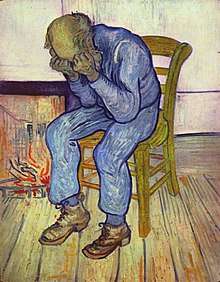
In the nineteenth century, ... official Western medicine recognized drapetomania, the tendency of slaves to run away from their owners, as a disease. ... With hindsight, drapetomania is easily dismissed as a harmful fabrication of fictitious disease. ... Less easy is it to recognize harmful fabrications of our own era for what they are. ~ Wim J. van der Steen, et. al.

What had been drapetomania became depression. ... Modern man runs away from a life that seems to him a kind of slavery. ~ Thomas Szasz
The melancholic errs by turning against his own ego all the critical energies that ought to be directed outward against the powers of the status quo. ... The ideal subject under capitalism is melancholic. ~ Klaus Mladek and George Edmondson

A low serotonin level . . . can dry up the wellsprings of life’s happiness, withering a person’s interest in his existence and increasing the risk of depression and suicide.
Ronald Kutulak
Ronald Kutulak
Depression is a state of low mood and aversion to activity.
A
- As a confirmed melancholic, I can testify that the best and maybe only antidote for melancholia is action. However, like most melancholics, I suffer also from sloth.
- Edward Abbey, A Voice Crying in the Wilderness (Vox Clamantis in Deserto) (1990)
- I think you ought to know I'm feeling very depressed.
- Marvin the Paranoid Android, in The Hitchhiker's Guide to the Galaxy (1979), Ch. 11
- Depression is known to be caused by a deficit of certain neurochemicals or neurotransmitters, especially norepinephrine and serotonin.
- Daniel Amen, Change Your Brain, Change Your Life, (1998), p. 48
- So what could be so useful about depression? Depressed people often think intensely about their problems. These thoughts are called ruminations; they are persistent and depressed people have difficulty thinking about anything else. Numerous studies have also shown that this thinking style is often highly analytical. They dwell on a complex problem, breaking it down into smaller components, which are considered one at a time.
- Paul W. Andrews, J. Anderson Thomson Jr., "Depression's Evolutionary Roots" Scientific American, (August 25, 2009).
- Analysis requires a lot of uninterrupted thought, and depression coordinates many changes in the body to help people analyze their problems without getting distracted.
- Paul W. Andrews, J. Anderson Thomson Jr., "Depression's Evolutionary Roots" Scientific American, (August 25, 2009).
- But depression is nature’s way of telling you that you’ve got complex social problems that the mind is intent on solving. Therapies should try to encourage depressive rumination rather than try to stop it, and they should focus on trying to help people solve the problems that trigger their bouts of depression. (There are several effective therapies that focus on just this.) It is also essential, in instances where there is resistance to discussing ruminations, that the therapist try to identify and dismantle those barriers.
- Paul W. Andrews, J. Anderson Thomson Jr., "Depression's Evolutionary Roots" Scientific American, (August 25, 2009).
- Though modern therapies exhort you to act against your passions (compulsions), claiming health and integration lies in that direction, you've learned that delving more fully into your pain, anger, despair, depression will move you through them to the other side, where you can use their energy to heal.
- Gloria Anzaldúa, Light in the Dark/Luz en lo Oscuro: Rewriting Identity, Spirituality, Reality (2015)
- The solution to your depression lies en esa cueva oscura [in this dark cave] and a deeper integration of your psyche.
- Gloria Anzaldúa, Light in the Dark/Luz en lo Oscuro: Rewriting Identity, Spirituality, Reality (2015), p. 111
- The soul uses everything to further its own making. … States which disrupt the smooth flow (complacency) of life are exactly what propel the soul to do its work: make soul, increase consciousness of itself. Our greatest disappointments and painful experiences—if we can make meaning out of them—can lead us toward becoming more of who we are.
- Gloria Anzaldúa, Borderlands/La Frontera: The New Mestiza (1987), p. 68
B
- None are so desolate but something dear,
Dearer than self, possesses or possess'd
A thought, and claims the homage of a tear.- Lord Byron, Childe Harold's Pilgrimage, Canto II (1812), Stanza 24
C
- Depression is seductive: it offends and teases, frightens you and draws you in, tempting you with its promise of sweet oblivion, then overwhelming you with a nearly sexual power, squirming past your defenses, dissolving your will, invading the tired spirit so utterly that it becomes difficult to recall that you ever lived without it...or to imagine that you might live that way again. With all the guile of Satan himself, depression persuades you that its invasion was all your own idea, that you wanted it all along. It fogs the part of the brain that reasons, that knows right and wrong. It captures you with its warm, guilty, hateful pleasures, and, worst of all, it becomes familiar. All at once, you find yourself in thrall to the very thing that most terrifies you. Your work slides, your friendships slide, your marriage slides, but you scarcely notice: to be depressed is to be half in love with disaster.
- Stephen L. Carter, The Emperor of Ocean Park Ch. 12, A Special Delivery, II (2002)
- Desolate—Life is so dreary and desolate—
Women and men in the crowd meet and mingle,
Yet with itself every soul standeth single,
Deep out of sympathy moaning its moan—
Holding and having its brief exultation—
Making its lonesome and low lamentation—
Fighting its terrible conflicts alone.- Alice Cary, Life; reported in Hoyt's New Cyclopedia Of Practical Quotations (1922), p. 189
- I am cross and depressed, and people bore me with their excessive attentions. I can't breathe, I can't work; I feel alone, alone, alone, although I am surrounded. There are a whole lot of ladies, 70 to 80 year-old lords, but no young folk: they are all out shooting. One can't get out of doors because it has been raining and blowing for several days.
- Frédéric Chopin, cited in chopin-society.org.uk
- The term clinical depression finds its way into too many conversations these days. One has a sense that a catastrophe has occurred in the psychic landscape.
- Leonard Cohen, as quoted in The International Herald Tribune (4 November 1988)
D
H
- In the last decade, neuroscience and psychiatric research has begun to unlock the brain’s secrets. We now know that mental illnesses – such as depression or schizophrenia – are not “moral weaknesses” or “imagined” but real diseases caused by abnormalities of brain structure and imbalances of chemicals in the brain.
- Richard Harding (President of the APA), "Unlocking the Brain’s Secrets", Family Circle magazine (20 November 2001), p 62
- That terrible mood of depression of whether it’s any good or not is what is known as The Artist’s Reward.
- Ernest Hemingway, in a letter to F. Scott Fitzgerald (13 September 1929), published in Ernest Hemingway : Selected Letters (1981), edited by Carlos Baker
K
- He's turned his life around. He used to be depressed and miserable. Now he's miserable and depressed.
- Harry Kalas, introducing Phillies outfielder Garry Maddox at a banquet; as featured in "Quotable," in The Philadelphia Inquirer (February 26, 1981)
- In addition to my other numerous acquaintances, I have one more intimate confidant. ... My depression is the most faithful mistress I have known—no wonder, then, that I return the love.
- Søren Kierkegaard “Diapsalmata”, Either/Or (1843) Vol. 1, of 1987 Hong translation
- Enough has been said about the light-mindedness of the age; it is high time, I think, to say a little about its depression. … The egotistical depression naturally fears on its own account and, like all depression, is self-indulgent in enjoyment. … Sympathetic depression is more distressing and also somewhat more noble; it fears itself for the sake of the other.
- Søren Kierkegaard, Either/Or (1843), Vol. 2, Hong translation, pp. 24-25
- Sometimes, my heart hurts so much, I beat it with my fists. I try to run. But you cannot run away from this. You cannot run from it. Wherever you run, it waits for you. Even when you think you have escaped it, it is there, where you have run to. It waits for you, to ambush you. It is like those vines called lianas, those tropical creepers that grow around you and strangle you. You cut off one branch, but there is another that grows. You leap over the wall of one ghetto and find yourself in another ghetto.
- Klaus Kinski, as quoted in "Klaus Kinski & The Thing" by Marcelle Clements, in Playboy (November 1985), Vol. 32, Iss. 11, pg. 84-86 + 178-190
- Although previously the monoamine systems were considered to be responsible for the development of major depressive disorder (MDD), the available evidence to date does not support a direct causal relationship with MDD. There is no simple direct correlation of serotonin or norepinephrine levels in the brain and mood. In other words, after a half-century of research, the chemical-imbalance hypothesis as promulgated by the drug companies that manufacture SSRIs and other antidepressants is not only without clear and consistent support, but has been disproved by experimental evidence.
L
- The way nerves talk to each other, and communicate, is through the secretion of a chemical called a neurotransmitter, which stimulates the circuit to be activated. And when this regulation of chemical neurotransmission is disturbed, you have the alterations in the functions that those brain areas are supposed to, to mediate. So in a condition like depression, or mania, which occurs in bipolar disorder, you have a disturbance in the neurochemistry in the part of the brain that regulates emotion.
- Jeffrey Lieberman, Causes of Depression, University Hospital of Columbia and Cornell (19 June 2012)
- No one is so accursed by fate,
No one so utterly desolate,
But some heart, though unknown,
Responds unto his own.- Henry Wadsworth Longfellow, Endymion (1842), Stanza 8
M
- Abomination of desolation.
- Matthew, XXIV 15; Mark, XIII. 14
- Depression is the inability to construct a future.
- Rollo May, in "Love and Will" (1969), Ch. 9
- Males with depressed roommates may end up feeling a bit blue themselves, according to Daniel Eisenberg, an assistant professor of public health at the University of Michigan who recently led a survey of 1,600 freshmen at two universities — a public one in the Midwest and a private one in the Northeast — on the issue. He found no such carryover for female students.
This mood contagion seems to occur when the student keeps his feelings bottled up, Dr. Eisenberg says. And it’s only a mild case; roommates typically don’t develop their friends’ more serious conditions.
“It’s not like you catch a mental-health cold,” he says. “People are resilient. They have a lot of coping strategies.”- Abigail Sullivan Moore, “The Science of Roommates”, The New York Times, (July 23, 2010)
- The melancholic errs by turning against his own ego all the critical energies that ought to be directed outward against the powers of the status quo. ... Encouraged to draw all of his aggressions inward, away from the true source of discontent, the compliant melancholic sets up a superegoic agency harboring the ego’s own former rage against the object. ... Introjection becomes a form of deflected critique. Meanwhile, the berated and debased ego, busy with its own internal insufficiencies and thoroughly discouraged from political activism, is not only fully censured but also is fashioned into a willing, productive—if ultimately impotent—participant in society. ... The ideal subject under capitalism is melancholic.
- Klaus Mladek and George Edmondson, “A Politics of Melancholia,” in Leftist Ontology (2009), edited by Carsten Strathausen, p. 209
P
- Can you help me remember how to smile
Make it somehow all seem worthwhile
How on earth did I get so jaded
Life's mystery seems so faded
I can go where no one else can go
I know what no one else knows
Here I am just drownin' in the rain
With a ticket for a runaway train.- Dave Pirner, Runaway Train (1993)
R
- People here [in Congress] often think of depression as being sad; no matter what I tell other legislators, they don't know. They don't understand how it is emptiness, how it is a vast nothing.
- U.S. Representative Lynn N. Rivers, as quoted in The Noonday Demon: An Atlas of Depression by Andrew Solomon
- Depression is the most unpleasant thing I have ever experienced. … It is that absence of being able to envisage that you will ever be cheerful again. The absence of hope. That very deadened feeling, which is so very different from feeling sad. Sad hurts but it's a healthy feeling. It's a necessary thing to feel. Depression is very different.
S
- My desolation does begin to make
A better life.- William Shakespeare, Antony and Cleopatra (1600s), Act V, scene 2, line 1
- Noble deeds and hot baths are the best cures for depression.
- Dodie Smith, I Capture the Castle (1948), Ch. 3
- Living with depression is like trying to keep your balance while you dance with a goat — it is perfectly sane to prefer a partner with a better sense of balance.
- Andrew Solomon, in The Noonday Demon: An Atlas of Depression (2001), Ch. 3: Treatments
- Depression is melancholy minus its charms—the animation, the fits.
- Susan Sontag, in Illness as Metaphor (1978), Ch. 7
- In the nineteenth century, ... official Western medicine recognized drapetomania, the tendency of slaves to run away from their owners, as a disease. ... With hindsight, drapetomania is easily dismissed as a harmful fabrication of fictitious disease, in a culture violating human rights. Less easy is it to recognize harmful fabrications of our own era for what they are.
- Are you sure that medicine and psychiatry are on the right track, morally and scientifically, in providing millions of persons with drugs after having diagnosed them as depressed?
- Wim J. van der Steen, Vincent K. Y. Ho, Ferry J. Karmelk, Beyond Boundaries of Biomedicine: Pragmatic Perspectives on Health and Disease (2003), p. 29
- More serious depression, or depression that is quickly getting worse, should be treated with medication. Antidepressants are not “uppers” and they have no effect on normal mood. They restore brain chemistry to normal.
- Nada L. Stotland, (President of the APA), About Depression in Women, Op.Cit., p. 65
- What had been drapetomania became depression. ... Modern man runs away from a life that seems to him a kind of slavery.
- Thomas Szasz, "The Sane Slave: Social Control and Legal Psychiatry," American Criminal Law Review, vol. 10 (1971), p. 346
T
- My profession of psychiatry still views depression purely as an illness. Insurance limitations have pushed many psychiatrists away from talk therapy and toward the more efficient prescription pad. So “there’s a lot of institutional and scientific investment in the exclusively disease model of depression. I’m basically telling colleagues they’re medicating people when they shouldn’t be. That’s not going to be welcome news.
- J. Anderson Thomson, "Does Depression Have an Evolutionary Purpose?" Matthew Hutson, Nautilus, (February 9, 2017).
- Once you have identified with some form of negativity, you do not want to let go, and on a deeply unconscious level, you do not want positive change. It would threaten your identity as a depressed, angry, or hard-done-by person. You will then ignore, deny or sabotage the positive in your life. This is a common phenomenon. It is also insane.
- Eckhart Tolle in The Power of Now: A Guide to Spiritual Enlightenment (1997) p. 119
- All inner resistance is experienced as negativity in one form or another. All negativity is resistance. In this context, the two words are almost synonymous. Negativity ranges from irritation or impatience to fierce anger, from a depressed mood or sullen resentment to suicidal despair. Sometimes the resistance triggers the emotional pain-body, in which case even a minor situation may produce intense negativity, such as anger, depression, or deep grief. The ego believes that through negativity it can manipulate reality and get what it wants. It believes that through it, it can attract a desirable condition or dissolve an undesirable one.
- Eckhart Tolle in The Power of Now: A Guide to Spiritual Enlightenment (1997) p. 119
W
- The best thing for being sad … is to learn something.
- T. H. White, The Sword in the Stone (1963), Merlin, to Arthur
- In a strange way, I had fallen in love with my depression. I loved it because it was all I had. I thought depression was the part of my character that made me worthwhile. I thought so little of myself, felt that I had such scant offerings to give to the world, that the one thing that justified my existence at all was my pain.
- Elizabeth Wurtzel, Prozac Nation (1994)
See also
External links
Emotions
Adoration ~ Affection ~ Agony ~ Amusement ~ Anger ~ Anguish ~ Anxiety ~ Apathy ~ Awe ~ Boredom ~ Calmness ~ Cheerfulness ~ Compassion ~ Contempt ~ Contentment ~ Depression ~ Desire ~ Disappointment ~ Discontent ~ Disgust ~ Ecstasy ~ Embarrassment ~ Empathy ~ Enthusiasm ~ Envy ~ Euphoria ~ Fear ~ Gratitude ~ Grief ~ Guilt ~ Happiness ~ Hatred ~ Hope ~ Hostility ~ Humiliation ~ Impatience ~ Indignation ~ Insecurity ~ Jealousy ~ Joy ~ Loneliness ~ Loss ~ Love ~ Lust ~ Malice ~ Melancholy ~ Nostalgia ~ Panic ~ Passion ~ Pity ~ Pride ~ Rage ~ Regret ~ Remorse ~ Resentment ~ Sadness ~ Shame ~ Sorrow ~ Suffering ~ Surprise ~ Sympathy ~ Wonder ~ Worry
This article is issued from
Wikiquote.
The text is licensed under Creative
Commons - Attribution - Sharealike.
Additional terms may apply for the media files.
